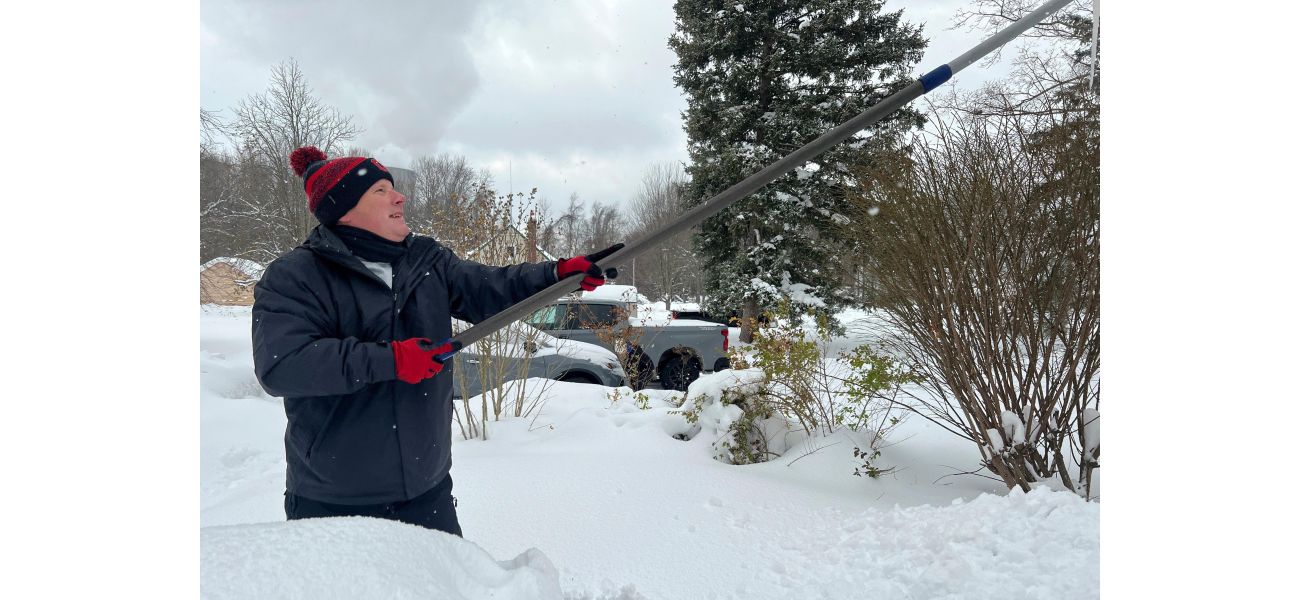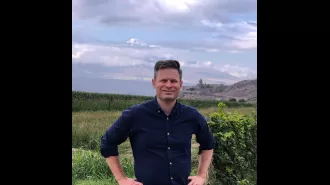Be prepared for snow, freezing rain, and extreme cold in many parts of the US.
A large winter storm with snow, ice, and cold temperatures is expected to start in the central U.S. on Saturday and move eastward. National Weather Service.
January 4th 2025.

As we head into the weekend, a major winter storm is making its way across the central United States. According to the National Weather Service, this storm is expected to bring heavy snow, icy conditions, and frigid temperatures to millions of people in the eastern two-thirds of the country.
Meteorologists have been closely monitoring this system, which made landfall on the West Coast on Friday. Heavy rain has been reported in the Pacific Northwest, while snow is expected in the Cascade Mountains. However, the real concern is the development of a major winter storm that will impact a large portion of the country over the next few days.
The storm is expected to bring widespread heavy snow to the Central Plains and move eastward. By Saturday evening, areas between central Kansas and Indiana can expect to see significant snowfall, with the highest amounts likely along and north of Interstate 70. In fact, meteorologists believe that some areas may see the heaviest snowfall in over a decade.
As the storm moves into the Ohio Valley, conditions are expected to worsen, with severe travel disruptions predicted. By Sunday and Monday, it will reach the Mid-Atlantic states, bringing with it the potential for blizzard conditions. Wind gusts over 35 mph and heavy snowfall rates could create whiteout conditions, particularly in Kansas and nearby areas of the Central Plains. This could make driving incredibly dangerous and increase the risk of becoming stranded.
In addition to heavy snow, the storm is also expected to bring freezing rain to eastern Kansas, Missouri, Illinois, Indiana, Kentucky, and West Virginia. This could have a major impact on power lines and lead to widespread power outages. Travel conditions are expected to be treacherous, with over a quarter-inch of ice accumulation possible.
Private meteorologist Ryan Maue has described the storm as a "potential disaster" and warns people to prepare for the worst. But unfortunately, the storm is just the beginning. Starting on Monday, a blast of frigid air from the Arctic will sweep across the eastern two-thirds of the country. This could bring temperatures 12 to 25 degrees Fahrenheit colder than normal, with wind chills making it feel even colder.
Forecasters at AccuWeather have warned that this could lead to the coldest January in the US since 2011. Dan DePodwin, Director of Forecast Operations, predicts that temperatures could remain well below average for up to a week. The most significant drop in temperatures is expected to be centered over the Ohio Valley, but even areas as far south as the Gulf Coast will feel the effects.
According to Danny Barandiaran, a meteorologist at the National Weather Service's Climate Prediction Center, Florida is also likely to experience a hard freeze. He adds that the wind chills will be brutal, making it dangerous to be outside for extended periods of time. Climate scientist Jennifer Francis, from the Woodwell Climate Research Institute, explains that while the global temperature is rising, it doesn't mean that cold snaps like this will disappear.
In fact, experts believe that this extreme weather may be triggered by the rapidly warming Arctic. Judah Cohen, seasonal forecast director at Atmospheric and Environmental Research, points out that the polar vortex, a mass of ultra-cold air that typically stays above the North Pole, can sometimes shift and bring bitter cold to other parts of the world. Cohen and his team have conducted studies that show an increase in the polar vortex stretching or wandering, which could be linked to climate change and the warming Arctic.
Meteorologists have been closely monitoring this system, which made landfall on the West Coast on Friday. Heavy rain has been reported in the Pacific Northwest, while snow is expected in the Cascade Mountains. However, the real concern is the development of a major winter storm that will impact a large portion of the country over the next few days.
The storm is expected to bring widespread heavy snow to the Central Plains and move eastward. By Saturday evening, areas between central Kansas and Indiana can expect to see significant snowfall, with the highest amounts likely along and north of Interstate 70. In fact, meteorologists believe that some areas may see the heaviest snowfall in over a decade.
As the storm moves into the Ohio Valley, conditions are expected to worsen, with severe travel disruptions predicted. By Sunday and Monday, it will reach the Mid-Atlantic states, bringing with it the potential for blizzard conditions. Wind gusts over 35 mph and heavy snowfall rates could create whiteout conditions, particularly in Kansas and nearby areas of the Central Plains. This could make driving incredibly dangerous and increase the risk of becoming stranded.
In addition to heavy snow, the storm is also expected to bring freezing rain to eastern Kansas, Missouri, Illinois, Indiana, Kentucky, and West Virginia. This could have a major impact on power lines and lead to widespread power outages. Travel conditions are expected to be treacherous, with over a quarter-inch of ice accumulation possible.
Private meteorologist Ryan Maue has described the storm as a "potential disaster" and warns people to prepare for the worst. But unfortunately, the storm is just the beginning. Starting on Monday, a blast of frigid air from the Arctic will sweep across the eastern two-thirds of the country. This could bring temperatures 12 to 25 degrees Fahrenheit colder than normal, with wind chills making it feel even colder.
Forecasters at AccuWeather have warned that this could lead to the coldest January in the US since 2011. Dan DePodwin, Director of Forecast Operations, predicts that temperatures could remain well below average for up to a week. The most significant drop in temperatures is expected to be centered over the Ohio Valley, but even areas as far south as the Gulf Coast will feel the effects.
According to Danny Barandiaran, a meteorologist at the National Weather Service's Climate Prediction Center, Florida is also likely to experience a hard freeze. He adds that the wind chills will be brutal, making it dangerous to be outside for extended periods of time. Climate scientist Jennifer Francis, from the Woodwell Climate Research Institute, explains that while the global temperature is rising, it doesn't mean that cold snaps like this will disappear.
In fact, experts believe that this extreme weather may be triggered by the rapidly warming Arctic. Judah Cohen, seasonal forecast director at Atmospheric and Environmental Research, points out that the polar vortex, a mass of ultra-cold air that typically stays above the North Pole, can sometimes shift and bring bitter cold to other parts of the world. Cohen and his team have conducted studies that show an increase in the polar vortex stretching or wandering, which could be linked to climate change and the warming Arctic.
[This article has been trending online recently and has been generated with AI. Your feed is customized.]
[Generative AI is experimental.]
0
0
Submit Comment





